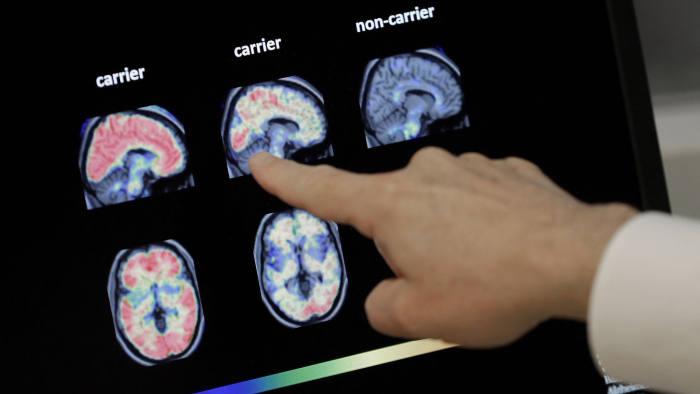The revival of a potential drug to fight Alzheimer’s, whose clinical trials had been declared futile just months ago, proved the value of sticking with the search for treatments for the disease when other pharmaceuticals companies are “running away”, according to the chief executive of its developer, Biogen.
By announcing on Tuesday that it would seek regulatory approval after all for its drug aducanumab, the US biotech company gave new hope to millions of patients and caregivers — and its shareholders.
Michel Vounatsos, Biogen chief executive, told the Financial Times that the new data analysed since the company halted a patient trial in March marked a “turning point in the fight against Alzheimer’s disease”.
But among Alzheimer’s researchers and campaigners, who have lived through decades of dashed hopes, the unmistakable excitement was tempered by a battle hardened caution. Biogen shares reflected that: having opened almost 40 per cent higher, they closed on Tuesday with a somewhat more modest 26 per cent gain.
While the opportunity is huge, so are the hurdles. The theory that Alzheimer’s patients suffer from a build-up of amyloid plaques — hard clumps of protein between nerve cells in the brain — may have found statistical support in a large-scale human trial for the first time, but the full data will not be published until December.
Biogen licensed aducanumab in 2007 from Neurimmune, a Swiss company which had found evidence some people benefited from antibodies that cleared away the plaques, and has been working to turn these antibodies into a potential drug ever since.
Read also;¬ÝMarket gains N15bn as investors raise bet on Dangote Cement, others
In March a so-called futility analysis of its two late-stage trials for the drug found the benefits did not outweigh the risks. The company abandoned the trials, seemingly adding aducanumab to the list of once-promising Alzheimer’s drugs that have failed in the late stages of testing, leaving the industry with little to show for the billions of dollars spent.
Mr Vounatsos said Biogen remained focused on finding treatments for the degenerative condition when other “companies are running away” and called the reversal “a testament to our persistence and pioneering role”.
Higher doses proved key to trial’s success
The Cambridge, Massachusetts based company said studying a larger data set had shown aducanumab did work if it was taken at higher doses, improving patient cognition and their ability to perform daily tasks such as cleaning and shopping and slowing their clinical decline by 23 per cent compared to a placebo. Crucially, it announced that the US drug regulator was open to it filing for an approval.
One of the two trials met its goal. On the study that failed, a subset of patients saw success: those who had taken more of the drug also had their decline slowed. Biogen had at first been cautious about giving higher doses because of a side effect that swelled the brain — but the majority of patients did not experience any symptoms.
Paola Barbarino, chief executive of Alzheimer’s Disease International, which represents 100 Alzheimer’s associations and federations around the world, described the announcement as “the most positive piece of news we have had in decades” but warned that it was “quite early stages”.











